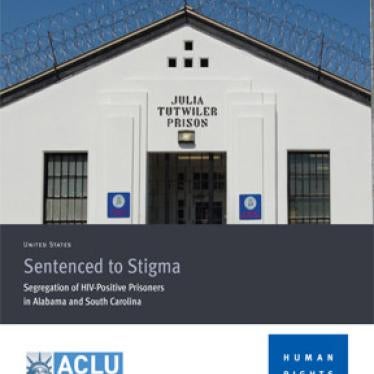(Birmingham, Alabama) - Alabama and South Carolina should immediately change their policy of segregating HIV-positive prisoners from the rest of the prison population, Human Rights Watch and the ACLU National Prison Project concluded in a report released today. Prisoners in the designated HIV units face stigma, harassment, and systematic discrimination that amounts to inhuman and degrading treatment, the report found.
The 45-page report, "Sentenced to Stigma: Segregation of HIV-Positive Prisoners in Alabama and South Carolina," says that prisoners in the HIV units are forced to wear armbands or other indicators of their HIV status, are forced to eat and even worship separately, and are denied equal participation in prison jobs, programs, and re-entry opportunities that facilitate their transition back into society.
"There is no medical or other justification for separating prisoners with HIV from the rest of the prison population," said Megan McLemore, health researcher at Human Rights Watch. "Like past policies of racial segregation, segregating prisoners with HIV is discriminatory, and the harm it causes extends well beyond the person's prison term."
Last month, after reviewing the findings of this report, Mississippi ended its longstanding policy of segregating of prisoners with HIV, leaving Alabama and South Carolina as the last US states to segregate HIV-positive prisoners. South Carolina is the only state in the union to prohibit HIV-positive prisoners from participating in work release programs.
The report highlights the mental suffering of prisoners forced to disclose their HIV status. In many cases, other prisoners send the news back to these prisoners' home communities, resulting in anguished letters from family members who had been unaware of the prisoners' status.
"Involuntary disclosure of anyone's HIV status can be devastating," said Margaret Winter, associate director of the ACLU National Prison Project. "But the consequences in a closed environment of a prison can be particularly severe - especially if prison officials impose a segregation policy, which only enflames prejudices against people with HIV."
Alabama and South Carolina officials contend that segregation is necessary to provide medical care and to prevent HIV transmission. But there are other ways to accomplish these goals that do not deny HIV-positive prisoners their rights, Human Rights Watch and the ACLU said. The other 48 states and the Federal Bureau of Prisons provide medical care for HIV without resorting to segregation.
HIV-positive prisoners segregated from the rest of the prison population are routinely denied opportunities that could shorten their prison stays and assist their transition into society, the report found. In Alabama, for example, HIV-positive prisoners are ineligible for "faith-based" or "honor" dorms and for residential drug treatment or pre-release programs that are linked to support groups in the community.
In South Carolina, HIV-positive prisoners may not work at the house of the prison director, join the bloodhound security detail, or earn "trusty" status - elite jobs that are earned through good behavior and are looked upon favorably by the parole board. Solely because of their HIV status, prisoners with sentences as short as 90 days must serve their sentences in the maximum security prison at Broad River, a more violent, more expensive facility that also houses death row.
The World Health Organization, the National Commission on Correctional Health Care and other experts agree there is no medical basis for segregating HIV-positive prisoners within correctional facilities or for limiting access to jobs, education or vocational programs available to others.
Nevertheless, in Alabama and South Carolina, the report says, HIV-positive prisoners are barred from working in the kitchen, a job that assists prisoners with employment after they return to society and that, in South Carolina, earns extra "good time" credits toward early release. Alabama officials told Human Rights Watch and the ACLU that they prohibit all HIV-positive as well as "openly gay" prisoners from working in the kitchen based on a "survey" of prisoner attitudes. The U.S. Centers for Disease Control and Prevention says that there is no medical basis for precluding persons with HIV from kitchen or food-service employment.
"Segregating prisoners with HIV sends a message to other prisoners, to staff, and even to the community that stigma and discrimination are acceptable," said McLemore, "Segregation is also bad public policy when prisoners are denied opportunities that will help them become productive citizens when they are released."






